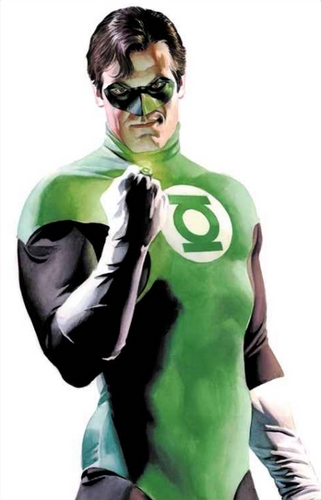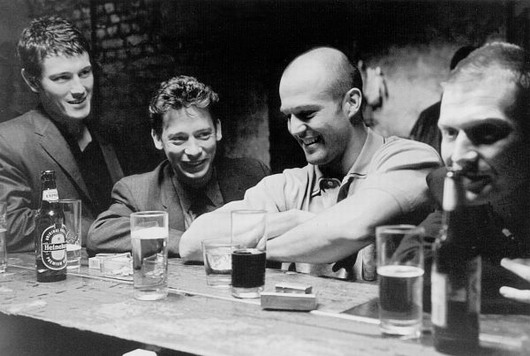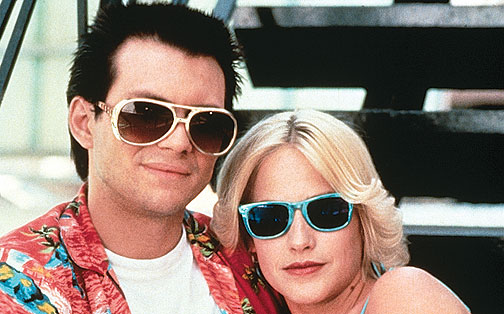Both Lock, Stock and Two Smoking Barrels (1998) and True Romance (1993) end in flamboyant, modern deus ex machinas. By “modern” I mean that there’s no god cranked down on a wince. Instead, salvation is attained through the entirely materialist force of dumb luck, also known as the scriptwriters finger on the scales. In Lock, Stock, director Guy Ritchie’s four bumbling lads stumble into wealth when about a billion other tougher, badder, smarter armed factions all happen to conveniently shoot each other, leaving our heroes as the only ones standing. In True Romance, director Tony Scott and writer Quentin Tarantino’s bumbling couple stumble into wealth when about a billion other tougher, badder, smarter armed factions all happen to conveniently shoot each other, leaving our heroes as the only ones standing.
In both films, the unlikely denoument is intended to be a tour de force; you’re supposed to admire the intricate mechanism of the plot just as, perhaps, the ancient Greeks admired that intricate mechanism which dropped the God onto the proscenium. And by that measure, at least, both films succeed; their narratives are energetically and pleasingly tangled. A plethora of bit characters — Christopher Walken and Dennis Hopper in True Romance, Vinnie Jones and Lenny McLean in Lock, Stock — roll about amidst the strands like profane kittens ingratiatingly farting. It’s maybe a little too cute, but overall not a bad way to kill a couple of hours.
In both films, though, one thing rankled. I was meant to like these people. As a viewer, I’m supposed to be rooting that Guy Ritchie’s four bozos don’t have their fingers chopped off, and that Sting (playing a sympathetically tough working-class dad to one of said four bozos) doesn’t lose his sympathetically tough working-class bar. I’m supposed to cheer because Christian Slater’s movie-star-tough-guy dreams all more or less come true rather than ending in a hail of bullets and a pool of his own blood. Plus he gets to bang Patricia Arquette for all eternity, or thereabouts. Yay!
Unfortunately, there’s been a slight miscalculation — that being that there’s nothing remotely likable about any of these characters. Guy Ritchie tries rather desperately to distinguish his four young boneheads one from the other or, indeed, from anyone, by giving hiply incongruous voice over tidbits about each one. It’s nice to see him try, but the main effect is not to make you like the characters, but rather to make you wonder why the so enthusiastically declaimed personality quirks don’t actually figure into the film anywhere else. For example, Eddie (is his name Eddie? oh, who the fuck cares) is supposed to be incredibly good at reading people — but he never reads anyone that I can tell. He just pals around with his pals and fucks up and gets into trouble and then gets out by screwing other people over and then gets really drunk, which is supposed to be endearing. He’s not even an irritating loser; he’s a hollow trope posing as an irritating loser.
Christian Slater (is his name Vince in the film? again, I refuse to care) is a bit more complicated. He’s a comic store clerk and an exploitation film freak — he tries to pick up a girl by asking her to a Sonny Chiba marathon; on his first date with Arquette (Alabama; I remember her name) he reads to her from some Spider-Man comics. He’s a nerd and a geek; eccentric and kind of sweet.
Supposedly. I think it may have worked in Tarantino’s original script. However, thanks to the direction by Tony Scott and a flat, unmotivated performance by Slater, the geek eccentricity never coheres. Instead, Slater quickly moves from loving fictional violent heroics to engaging in successful violent heroics himself — shooting pimps, stealing cocaine, screwing a movie star, and generally behaving like a movie star himself. Tarantino’s writing undercuts the heroism — Slater leaves his driver’s license at the scene where he killed the pimp, and his stupidity causes the death of his own father. But Scott and Slater are too dense to hear what Tarantino’s telling them; neither Slater nor the film ever realize that what’s interesting about Vince (or whoever) is not that he’s the star of the film, but that he isn’t.
For Tarantino, I think, Slater’s a fuck-up trying to be the hero he’s seen on film and failing. That’s a sympathetic and interesting character…and you’d have cared when he died, as he did in Tarantino’s original script. But the Slater we get instead is just another tough guy whose mistakes are never brought home to him, both in the sense that he doesn’t ever get to integrate them into his character and in the sense that he doesn’t suffer from them. Patricia Arquette is a more charismatic actor by far, and she is able to capture more of the vulnerability in Tarantino’s script even as she beats a mafia boss to death. But the happy ending, and the general drift of the direction, undoes her as well — her individuality is crafted in the teeth of the rest of the film, and the storybook happy ending cheerfully undoes her efforts, turning her into the beneficiary/victim of yet another Hollywood romance.
The protagonists in both these films, then, are heroes not because of anything they do or anything they are, but just because they’re there. They’re the young white guys on the marquee; God (or the director) loves them, and the world is organized for their benefit. There’s a depressing verity to that; the world really is in many ways organized for the benefit of young, stupid, boring white guys, especially if they’re attractive movie stars. But having that driven home in as gratuitous a fashion as possible is not quite the happy ending that the directors seem to think it should be.
________________
 I was thinking about these films in relation to the new Green Lantern movie — which I blissfully haven’t seen, though I’ve read Jog’s review, which is undoubtedly more entertaining as well as more informative. Anyway…I was thinking that a superhero’s real power isn’t super strength or super speed or a magic wishing ring, but unearned luck courtesy of some overinvested creator. In Lock, Stock and True Romance, the luck is backloaded; it comes in at the end after lots of plot manipulation. In superhero stories, it’s frontloaded — being bitten by a radioactive spider gives you amazing strength rather than cancer; having a shelf-full of chemicals fall on you gives you superspeed rather than chemical burns; you’re chosen out of everyone on earth because you’re a showboating dipshit, etc. etc. But backloaded or frontloaded, the power of luck works the same — providing both the mechanism for victory and the supposed justification of it. Hal Jordan is the hero because he’s chosen to have the ring, and he’s chosen to have the ring because he’s the hero. The logic is, appropriately, perfectly circular.
I was thinking about these films in relation to the new Green Lantern movie — which I blissfully haven’t seen, though I’ve read Jog’s review, which is undoubtedly more entertaining as well as more informative. Anyway…I was thinking that a superhero’s real power isn’t super strength or super speed or a magic wishing ring, but unearned luck courtesy of some overinvested creator. In Lock, Stock and True Romance, the luck is backloaded; it comes in at the end after lots of plot manipulation. In superhero stories, it’s frontloaded — being bitten by a radioactive spider gives you amazing strength rather than cancer; having a shelf-full of chemicals fall on you gives you superspeed rather than chemical burns; you’re chosen out of everyone on earth because you’re a showboating dipshit, etc. etc. But backloaded or frontloaded, the power of luck works the same — providing both the mechanism for victory and the supposed justification of it. Hal Jordan is the hero because he’s chosen to have the ring, and he’s chosen to have the ring because he’s the hero. The logic is, appropriately, perfectly circular.
Superheroes are generally seen as power fantasies…and obviously, they are that. But Lock, Stock and True Romance suggest another possibility too…which is that the power fantasies are closer to real life than might be altogether comfortable. Those (mostly) Western (mostly) white (mostly) guys who generally get to be superheroes…in real life, they really can wave their hands and destroy large portions of Afghanistan, just like Iron Man. They really can display some mystic green and bury themselves in ephemeral glowing toys. The fantasy isn’t the power so much as the adulation — the assurance that the luck is earned and that the whole world loves to be grist for the remorseless grinding of someone else’s plot.



Good call. Very interesting perspective.
Two words – Harry Potter.
Hah! It’s so true. My son is obsessed obsessed obsessed with Harry Potter now, and I am glad he has started reading by himself because lord knows I don’t want to have to read them to him.
On the other hand…it’s better than his superhero obsession. Best to look on the bright side….
Surely, though, the 3 examples Noah Berlatsky cites are cases of fiction supporting or violating the Narrative Fallacy?
Human beings have a tendency to impose structure on events. I remember an inquiry into heart attack survivors who were asked “why” they had an attack. They all, without exception, came up with a cause and a story– “I neglected my family” “I was eating like a pig since my wife left me” “The business was going down and I was helpless to stop it”.
In fact, over 90% of heart attacks are caused by genetic vulnerabilities; they probably would have occurred whether or not the sufferers had endured rotten ‘stories’.
So, when in ‘Lock, Stock’ or ‘True Romance’ the success seems ‘unearned’, we’re secretly unnerved and outraged. But, guess what? Life is like that.
Clean-living, saintly people get cancer while their three-pack-a-day smoking Big Mac chowers live to be a hundred. Total blanks buy a lottery ticket for the first time out of boredom and win millions.
But people won’t accept this in fiction, by and large. E.M. Forster killed off a main character almost arbitrarily in ‘Howard’s End’– it was unplanned– and even now, it’s the subject of endless academic fascination. But in real life, people don’t actually die for reasons. They just die.
I think this is what many folks found off-putting about ‘Green Lantern’. Superheroes are supposed to earn their superness. Batman’s parents are blown away, ditto Spidey’s Uncle Ben or Superman’s native planet. Hal Jordan’s like a guy who finds a wallet stuffed with Benjamins in the gutter. Where’s the story– or, rather, the ‘Story’?
I’m with norb on this, its been a while since I saw True Romance, but in Lock Stock I always had the impression that its very much aiming for the chaotic and impredictable aspect rather than any kind of ‘Deus Ex Machina’. The lead guys aren’t supposed to be heroes or even memorable, they’re just stereotypes of ‘gambler’, ‘dodgy market trader’, or whatever working class London sterotype you want. They’re just everymen. And I don’t even think Richie is making them anything more, the film isn’t about the four guys, its ‘about the ride’, its about the random chance. Hence the central symbolism of the Poker game. At some point everyone wins. This time its the losers. But that doesn’t make them heroes, it just makes them winners. This time.
Matthew Vaughn’s Layer Cake, which is basically the continuation of Richie’s films (with basically the same cast), takes it even further by having the (pointedly) nameless protagonist (who has just about managed to impose his will on the random chaos around him and ‘win’) shot unexpectedly by a previously minor character in the final moments.
Lock Stock isn’t really about white guys winning by Deus Ex Machina, its about ordinary everymen winning occasionally, by blind luck. And next time they’ll probably lose again. As Norb says, that sort of thing doesn’t fit the superhero genre, you need reasons and a structure. Which also explains the tortured reasoning JK Rowling ends up employing in the later Potter books to explain that Harry is special despite all the available evidence. Anyway, it just seemed like an odd thing to bash Lock Stock for when there are so many other things to bash it with. Like Jason Statham.
No…you’re supposed to find the four lads endearing/colorful/interesting. They’re bumbling, but endearingly so. (In theory, at least; dicier in practice.)
I quite like Jason Statham in other contexts. Transporter is a great movie.
I get the gist of this, but isn’t luck pretty much unearned by definition?
Have you seen the movie “In Bruges?” There’s a fair amount of dumb luck in that one too, but the plot moves like clockwork to get all the bits an pieces in place. So when the big dumb stroke of luck occurs turn it snaps a bunch of previously random events into place. As a result, the ending seems more clever than cop out. This is in contrast to “Lock Stock,” or “Snatch,” where a concatenation of events builds up to an impasse conveniently resolved in a shoot out that happens to favor the protagonist.
“isn’t luck pretty much unearned by definition”
Luck isn’t earned…but it’s not necessarily random either. Or rather, what looks like random luck is often linked to other factors. Like privilege.
Or to put it another way. From one perspective, it’s bad luck that the (very competent) black gangsters all get killed, while the wastrel white boys survive. From another perspective, it’s not luck at all, because heroes are almost always white, so the black guys never had a chance. (Some white guys die too, of course…being white is necessary for survival but not sufficient.)
My point is that that dynamic has parallels outside of film as well.
Point taken… luck might be equally distributed, but opportunities to succeed and fail aren’t.
I taught Upton Sinclair’s “Jungle” in a freshman English class. I was amazed at how many students chalked the protagonist’s fortunes up to bad luck, as opposed to structural inequalities.
What’s really pernicious about all this is how it sells the attitude that you don’t have to be anything special, or work at anything, just be a total slacker, and ’cause you happen to be “the One,” everything will work out great for you, and you’ll end up triumphing over those who are far more competent, intelligent, etc.
Which leads to voters who don’t care that George W. Bush, Sarah Palin, or Michele Bachmann ( http://www.rollingstone.com/politics/news/michele-bachmanns-holy-war-20110622 ) don’t have much in the way of snotty elitist qualities like intelligence, knowledge, or positive achievements…
And therefore — in that “life imitates art” way — you end up with George W. as President, Palin and Bachmann electorally stomping better-qualified competitors…
Well, Palin hasn’t stomped anyone since she got a national profile. People hate her. Her negatives are through the roof.
Mike Hunter:
“What’s really pernicious about all this is how it sells the attitude that you don’t have to be anything special, or work at anything, just be a total slacker, and ’cause you happen to be “the One,” everything will work out great for you, and you’ll end up triumphing over those who are far more competent, intelligent, etc.”
But Mike– that’s the ugly truth. Again and again, lazy undeserving morons get the cherry pie with ice cream on top, while deserving hard workers eat shit.
Ecclesiastes 9:11:
“I returned, and saw under the sun, that the race is not to the swift, nor the battle to the strong, neither yet bread to the wise, nor yet riches to men of understanding, nor yet favour to men of skill; but time and chance happeneth to them all.”
Hey, it’s in the Bible, so it’s true.
(BTW, Palin and Bachman are the best things to have happened to the Democratic Party in years. The Teabaggers, after having cost the Republicans the Senate, are going to cost them the Presidency now.)
————————-
Noah Berlatsky says:
Well, Palin hasn’t stomped anyone since she got a national profile. People hate her. Her negatives are through the roof.
————————–
But the ones who love her, really, REALLY love her! (Didja check out that Michele Bachmann article?)
————————–
norb says:
…that’s the ugly truth. Again and again, lazy undeserving morons get the cherry pie with ice cream on top, while deserving hard workers eat shit.
————————–
Rub it in, why don’t you! (Great Bible quote…thanks!)
Hope you’re right about the Teabaggers dooming the GOP; but here in Florida, we’ve got a TB-supported governor trampling all over and slashing funds for state workers, the poor, sick, and old. And though his negative poll numbers slightly outweigh his positives, he has the fanatical support from Republicans that Dem politicos, always able to snatch defeat from the jaws of victory, cannot dream of.
Come the next gubernatorial elections, liberal voters will probably end up splitting their votes with the Green party, or some other such admirably idealistic but hopelessly doomed group, and give it over to the Republicans again.